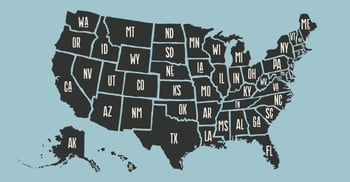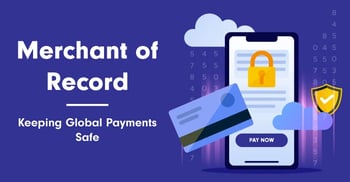EU VAT: Complete Guide To Optimize Global Compliance Processes

Tax laws provide major challenges for software and SaaS companies that sell internationally. Businesses risk costly fines, lost sales, and reputational harm if they don't have effective tax management systems in place. Many businesses discover too late that there is no minimum threshold to protect smaller enterprises from immediate tax liabilities resulting from a single transaction in the EU.
Five crucial International VAT compliance for SaaS best practices are examined in this article to assist your company in navigating these complicated rules. Above all, we'll demonstrate how working with a Merchant of Record (MoR) like PayPro Global may completely remove these compliance issues, allowing you to concentrate on expanding your company rather than handling foreign tax responsibilities.
As payment specialists for software, SaaS, and video game companies in international markets, we have assisted hundreds of organizations in overcoming tax compliance obstacles that would have otherwise hindered their ability to expand internationally. According to our expertise, adhering to EU tax regulations for software can be turned from a hindrance to a chance for long-term, steady growth with the correct strategy.
Understanding the 2024 EU VAT Changes
Starting January 1st, 2024, payment processors must report all cross-border transaction data to tax authorities as part of the EU's initiative to combat international online fraud. For SaaS and software businesses making more than 25 sales per quarter within the EU, your payment service provider must now log these transactions in the Central Electronic System of Payment Information (CESOP) database.
This represents a fundamental shift in tax enforcement capability, as CESOP will aggregate and verify your sales data against other EU databases, making information readily available to anti-fraud experts across all member states. In practical terms, tax authorities can now easily cross-reference your VAT filings against actual sales data provided by payment processors.
The Zero-Threshold Challenge
Unlike US sales tax regulations where liability typically begins after reaching certain sales thresholds, EU VAT compliance begins with your very first sale. This creates an immediate compliance burden that many SaaS companies are ill-prepared to handle.
Implementing proper EU VAT compliance from day one not only prevents penalties but also creates a foundation for seamless scaling. Companies with robust tax management systems can enter new EU markets quickly without compliance delays, gaining competitive advantages through faster market entry.
The One-Stop Shop (OSS) Scheme
Instead of registering and filing into each country individually, businesses selling across the European Union can register for VAT and file VAT returns through the One-Stop-Shop (OSS) scheme.
While switching to the OSS scheme is perceived as a major simplification for businesses operating within the EU, bringing about multiple benefits such as reduced compliance costs or administrative workload, it remains a complex system that should be reviewed carefully.
Reverse Charge Mechanism
In certain instances, when selling to other businesses based in the EU, the reverse charge mechanism comes into play. This is actually a VAT calculation method that switches the responsibility of tax registration and payment from the seller to the buyer. This mechanism is intended to simplify tax management for businesses.
To correctly implement this change, you need to adapt your invoicing system for the B2B transactions where this mechanism applies, indicating when the customer is responsible for VAT.
eCommerce Partner
Thrive with the industry's most innovative all-in-one SaaS & Digital Goods solution. From high-performing payment and analytics tools to complete tax management, as well as subscription & billing handling, PayPro Global is ready to scale your SaaS.
Sell your SaaS globally with PayPro Global!
5 Best Practices For International VAT Compliance for SaaS
1. Best Practice #1: Implement Advanced Checkout Location Tracking
he location of the consumer, not your place of business, determines the EU VAT rates. Since VAT rates vary greatly, this basic premise necessitates precisely determining the origin of each transaction.
The crucial error many companies make is using oversimplified location identification techniques that fall short of EU requirements for "sufficient evidence" of customer location. Regulations demand at least two non-contradictory pieces; therefore, a single IP address check is insufficient.
Comprehensive Location Validation Benefits
Beyond compliance, there are other advantages to implementing appropriate location validation. It guarantees that clients are billed at the appropriate tax rate, avoiding undercharging, which exposes your business to tax liabilities, and overcharging, which lowers conversion rates. Additionally, it offers documentation to protect one against possible tax audits.
To put in place efficient location tracking:
- Use multiple location indicators, including:
- IP address geolocation
- Billing address verification
- Bank or payment method country identification
- Phone number country code validation
- Keep a note of every transaction's location evidence (certain jurisdictions' EU legislation demands storage for up to 10 years).
- When various location indicators yield inconsistent results, put in place a conflict resolution framework.
- Make use of a trustworthy geolocation API that refreshes its database often to reflect changes in IP range.
Key Takeaway: Accurate location detection is the cornerstone of EU VAT compliance; getting it wrong undermines all subsequent compliance efforts.
2. Best Practice #2: Implement Robust VAT Number Validation
For business-to-business (B2B) transactions in the EU, VAT Identification Numbers (VATINs) validation is essential since they establish if the reverse charge mechanism is applicable. These figures, when correctly verified, greatly reduce your tax responsibilities by enabling you to sell to EU companies without imposing VAT.
Many businesses either fail to implement VATIN validation or use simple format validation that doesn't verify if the number is actually registered and active. If tax authorities later find that you employed the reverse charge method incorrectly, you run a serious risk.
The Cost of Improper VATIN Handling
Inadequate VATIN handling has a significant financial impact. You are responsible for the unpaid VAT and possible fines and interest if you misapply the reverse charge.
To apply VATIN validation correctly:
- During checkout, do real-time validation by integrating with the EU's VIES (VAT Information Exchange System).
- As proof of due diligence, keep validation timestamps and confirmation numbers on file.
- Revalidate saved VATINs for clients who regularly receive recurring invoicing.
- Establish explicit procedures for managing unsuccessful validations, such as alerting clients with invalid numbers.
- Make that the reverse charge mechanism is used when it is indicated in your invoicing system.
Key Takeaway: One of the few chances to significantly streamline international EU VAT compliance for SaaS is through proper VATIN validation.
3. Best Practice #3: Dynamic VAT Rate Management
There are currently more than 75 distinct VAT rates in the EU, which vary by nation and product type. There are certain exceptions to the general taxation for digital services. Additionally, these rates fluctuate over time, necessitating ongoing system changes and monitoring.
Using static VAT rates that aren't updated frequently is a typical mistake that can result in either undercharging (which increases your company's tax burden) or overcharging clients (which hurts conversion rates).
Comprehensive Rate Management Benefits
Maintaining correct VAT rates shields your company from responsibility while ensuring pricing clarity for customers. Additionally, it enables smart pricing decisions that take market-specific tax variations into consideration.
To efficiently control VAT rates:
- Follow official sources or specialized services to keep track of tax rate changes.
- Put in place a tax rate database that separates your main pricing code and tax logic.
- Establish automated testing processes to confirm tax computations in various contexts.
- Make sure your system takes into consideration unique circumstances, such as temporary rates or VAT reductions.
- To address exception situations, implement granular control over rates at the national and product levels.
Key Takeaway: Dynamic VAT rate management ensures compliance with ever-changing tax laws while safeguarding your bottom line and consumer experience.
4. Best Practice #4: Comprehensive Record-Keeping Systems
According to EU VAT requirements, comprehensive records of every transaction must be kept, including invoices, location proof, customer data, and tax computations. Depending on the jurisdiction, these documents must be kept in a secure location for a maximum of ten years.
Insufficient records or records stored in formats that are hard to access or interpret when needed for reporting or audits are two examples of how many companies undervalue this documentation burden.
The Value of Structured Record-Keeping
Comprehensive record-keeping offers useful business insights on your success in the EU market in addition to compliance. Information on market penetration, regional variations in pricing sensitivity, and growth prospects can be gleaned from properly structured tax data.
To put into practice appropriate record-keeping:
- Maintain the connections between payments, clients, and tax computations by storing all transaction data in structured formats.
- Keep digital copies of all invoices that have been issued, along with the relevant tax data.
- Maintain tax records and use safe, long-term storage options that adhere to GDPR.
- To guarantee data integrity, establish backup mechanisms and routine verification procedures.
- Create reporting and data retrieval procedures that can react swiftly to audit demands.
Few accounting systems are made especially to meet the criteria of EU VAT compliance, even though many provide basic record-keeping features. Custom development or specialist third-party solutions are frequently needed to close this gap.
Key Takeaway: The goal of thorough record-keeping is to generate corporate knowledge that offers strategic advantages and protects against expensive audits, not only to ensure compliance.
5. Best Practice #5: Automated EU VAT Filing and Remittance
VAT filing and remittance across several EU states are still complicated, despite the One-Stop Shop (OSS) program. It necessitates going through multiple web portals with different languages and interfaces in addition to comprehending diverse filing frequencies, formats, and payment methods.
Manual filing quickly becomes too expensive. A mid-sized SaaS business that sells throughout the EU usually invests 15 to 20 hours every quarter in VAT filing, which adds up to between €5,000 and €8,000 in administrative expenses annually.
The Efficiency Advantage of Automation
The time and money involved in maintaining VAT compliance are significantly decreased by automated filing systems. Additionally, they reduce human errors, which are major contributors to compliance penalties.
To put into practice appropriate record-keeping:
- Connect to tax filing APIs that are directly connected to open-source software solutions.
- Put in place procedures for reconciliation that check reported numbers against transaction records.
- To guarantee that filing deadlines are never missed, create calendar systems.
- Install monitoring tools to verify that payments and submissions were received successfully.
- Create audit trails that record every filing action.
Although some tax management platforms allow for filing, many SaaS companies discover that working with a specialized supplier is more economical due to the technological complexity and ongoing maintenance needs.
Key Takeaway: One of the most resource-intensive parts of EU VAT compliance is made predictable and efficient by automated filing, which frees up resources for other business operations.
The Merchant of Record Solution
What is a Merchant of Record and Why It Matters
A service provider who assumes legal responsibility for your sales, including tax compliance, payment processing, and associated regulatory duties, is known as a Merchant of Record (MoR). This indicates that the MoR manages all facets of tax computation, collection, filing, and payment on your behalf to comply with EU VAT.
An MoR can eliminate these obligations by taking on the role of product reseller for their transactions, reducing time, effort, and investments.
How PayPro Global's MoR Solution Works
As your Merchant of Record, PayPro Global:
1. Serves as your products' authorized reseller in every jurisdiction.2. Handles all aspects of tax management, including:
- Location detection and validation
- VAT number verification
- Tax rate application
- Invoice generation
- Filing and remittance
- Audit response
3. Provides additional benefits including:
- Local payment methods increasing conversion rates
- Subscription management
- Fraud prevention
- Customer support for payment issues
- Revenue recovery systems
Key Takeaway: A Merchant of Record enables you to swiftly access markets while concentrating fully on your main company by converting EU VAT compliance from an operational burden into a strategic advantage.
eCommerce Partner
Thrive with the industry's most innovative all-in-one SaaS & Digital Goods solution. From high-performing payment and analytics tools to complete tax management, as well as subscription & billing handling, PayPro Global is ready to scale your SaaS.
Sell your SaaS globally with PayPro Global!
Conclusion
For software and SaaS enterprises, navigating EU VAT compliance presents serious hurdles. Although putting the five best practices into practice can assist in managing these responsibilities, they come with a high cost regarding technology, knowledge, and continuous upkeep.
The most effective way to achieve complete compliance for most software and SaaS companies is to collaborate with a Merchant of Record such as PayPro Global. A MoR collaboration not only removes tax obligations but also speeds up market entry, increases conversion rates through better payment experiences, and frees up your team to concentrate on customer acquisition and product development, which are the major drivers of real business success.
Book a call with PayPro Global today and discover how our complete payment infrastructure can strategically scale your business in global markets.
Frequently Asked Questions
Why is customer location tracking so important for EU VAT on digital goods?
Because EU VAT rates differ by country and are based on the location of the consumer rather than your company, tracking the location of your customers is essential. A single IP address is insufficient; regulations require at least two non-contradictory pieces of evidence proving consumer location. Precise monitoring guarantees accurate invoicing and prevents fines.
How does VATIN validation help my B2B SaaS sales in the EU?
Applying the reverse charge mechanism for business-to-business transactions requires verifying your client's VAT Identification Number (VATIN) via the EU's VIES system. This greatly simplifies your tax obligations by enabling you to sell to EU companies without imposing VAT. Applying this incorrectly may result in fines in addition to the underpaid VAT.
With over 75 EU VAT rates, how can my software company stay compliant?
Dynamic VAT rate management that monitors continuous changes between nations and product categories is necessary to maintain compliance. It's dangerous to use static rates because you could undercharge (which would be your liability) or overcharge (which would decrease sales). The most important feature is a system that updates automatically according to specialized services or authoritative sources.
What records do I need to keep for EU VAT compliance for my software sales?
Comprehensive record-keeping, including invoices, proof of customer location, customer data, and tax calculations for each transaction, is required by EU VAT regulations for a maximum of ten years. These documents need to be readily available for reporting or audits and kept in a safe location. To properly handle this paperwork burden, strong systems are required.
Is there an easier way for my SaaS business to handle EU VAT filing and payments?
Indeed, employing a Merchant of Record (MoR) or automating EU VAT filing and remittance can greatly streamline the procedure. Manual filing across several EU states is difficult and expensive (a mid-sized SaaS would likely spend between €5,000 and €8,000 a year). This burden is lessened, mistakes are reduced, and deadlines are met with automation or a MoR.
When does my SaaS company need to start worrying about EU VAT?
From the moment you make your first sale to a customer in an EU nation, your SaaS business must deal with EU VAT. The EU has a zero threshold for VAT on digital goods, in contrast to various tax regimes with sales thresholds. This implies that as soon as you make a transaction in the EU, you are subject to immediate compliance duties.
Ioana Grigorescu
Ioana Grigorescu is PayPro Global's Content Manager, focused on creating strategic writing pieces for SaaS, B2B, and technology companies. With a background that combines Languages and Translation Studies with Political Sciences, she's skilled in analyzing, creating, and communicating impactful content. She excels at developing content strategies, producing diverse marketing materials, and ensuring content effectiveness. Beyond her work, she enjoys exploring design with Figma.
-
1.Explore PayPro Global's Solutions: See how our platform can help you streamline your payment processing and boost revenue.
-
2.Get a Free Consultation: Discuss your specific needs with our experts and discover how we can tailor a solution for you.
-
3.Download our Free Resources: Access valuable guides, checklists, and templates to optimize your online sales.
-
4.Become a Partner: Expand your business by offering PayPro Global's solutions to your clients.
- Due to new rules and zero-threshold liability, EU VAT compliance in 2024 necessitates careful monitoring, verification, and administration.
- Avoiding fines and guaranteeing accuracy require the use of best practices such automated filing, VATIN validation, and sophisticated location tracking.
- To unload VAT complications and concentrate on growing your business and expanding internationally, consider using a Merchant of Record (MoR) like PayPro Global.
Get the latest news


